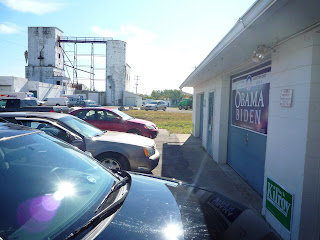No more midterms, get ready for the real test
I just finished my second and last mid-term (econometrics, wasn't all that hard) and before I will submerge in the craziness of an American Halloween-celebration (everybody's telling me it's going to be incredible) I'm trying to update this blog. Of course it's important for me to get good results on those midterms, but what's much more important is the outcome of the elections that will take place on Tuesday. I can't believe that it will take place in just a few days, and to be honest, I'm more than just slightly worried about the results. Not because of the polls, the campaign-strategy of Obama or the counter-attack of McCain (the best he came up with was recruiting Joe the Plumber as a speaker on his rallies!). The procedures people have to go through before they can cast their ballots, however, does seem to be a serious obstacle in free and fair elections.
First of all, many voter registration are declared not valid because of inconsistencies between the data on the voter-registration form and the records of the local government. As a results, officials have denied hundreds of thousands of people the right to vote, and in some states these decisions are contested in court (see for example the Washington Post). On the other hand, voter-registration campaigns of Acorn have led to fraudulent voter registration. And once a voter is properly registered, it's still quite hard to vote. On election day, people might have to wait for hours standing in the line before they can vote. In the Netherlands, I never had to wait more than five minutes before I could cast my ballot. And I asked my Russian friend, and she said voting was much easier in her country as well. If people do take the effort to go to the polls (which are only open until 7pm on a working day (!), at least, in Virginia) and make it to the voting booth, a complicated ballot or malfunctioning voting machines makes it difficult to cast a valid vote. And those are just the procedural irregularities that might prevent votes from being count (see the financial times for more details). It is possible to vote early, actually, about a third of the electorate has done so, but even at the early-voting polls, waiting times are very long.
But I've heard more unsettling stories. It appears that some voting districts are provided too few ballots or voting machines, making waiting times even longer or voting outright impossible. I even heard people are intimidated to make them vote for a certain candidate.
To make sure as many votes as possible do make it to the ballot box, the democrats are pushing for a final battle throughout the US. In Virginia, volunteers are campaigning every day all day, and on election day in just one small district some 200 volunteers will be mobilized to get people to the polls, in the waiting line and in the voting booth. They even provide umbrella's and hot cocoa in case cold weather or rain will keep people at home.
Apparently, it's what it takes to stand a chance in the elections in the US. That suggests that they aren't as free and fair as they should be. And while everyone recognizes these problems, little is done to change it. Apparently those in power benefit from the present system. Let's hope the American population can turn the tide and make change possible.





